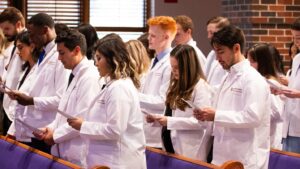
- Home
- Academics at HSU
- Graduate Programs
- Master of Physician Assistant
Master of Physician Assistant
CASPA Application Timeframe
Open date: April 25, 2024
Deadline date: October 1, 2024.
Earn a Master of Physician Assistant degree from Hardin-Simmons University and start making a difference in the health of individuals and communities across Texas and the nation. We take great pride in the many successes of our physician assistant graduates, including a 97% five-year first-time average pass rate on the National Certifying Exam (PANCE) and a 100% employment rate.
The HSU Master of Physician Assistant program has been recognized for its excellence with Accreditation-Continued status by the Accreditation Review Commission on Education for the Physician Assistant Inc. (ARC-PA). Our program stands out from other physician assistant programs around the country thanks to a balanced combination of small class sizes, hands-on learning, and a commitment to community service.
Clinical and Service-Learning Opportunities in the Master of Physician Assistant Program
Graduates from our physician assistant program have hundreds of hours of experience in clinical rotations through the following clinical experiences: family medicine, pediatrics, women’s health, mental health, internal medicine, surgery, emergency medicine, and any electives you choose to pursue. Each student will also get the chance to complete at least one clinical rotation in a rural or medically underserved area.
Our students dedicate a minimum of 50 hours to community outreach, including the chance to join our annual mission trip. In the past, physician assistant program students have traveled to Peru, the Dominican Republic, and Kenya where they had the opportunity to provide medical care to those communities. There’s no better way to begin a physician assistant career than experiencing the satisfaction of helping those in need across the world.
Register for 2024 Open House Opportunities
- May 14 – Virtual 5:30–7:30 p.m.
- June 11 – In-person 10:30 a.m.–12:30 p.m.
- July 16 – In-person 10:30 a.m.–12:30 p.m.
- August 13 – Virtual 5:30–7:30 p.m.
Program Contact
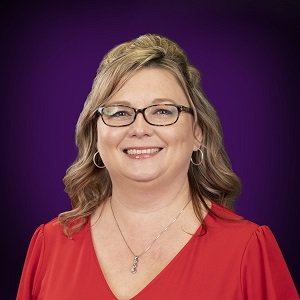
Why earn your Master of Physician Assistant Degree at Hardin-Simmons?
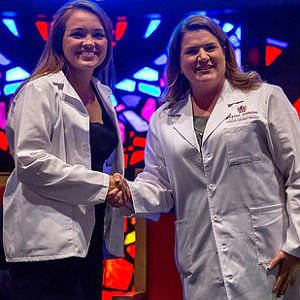
World-Class Physician Assistant Program Faculty
Thanks to our small student to faculty ratio (11:1), you’ll work closely with distinguished, award-winning faculty as you complete your physician assistant schooling at HSU. You’ll learn from faculty members who sit on the Texas PA board, who chair the National Exam Development Board for the PA Education Association, and who have won multiple faculty member of the year awards.
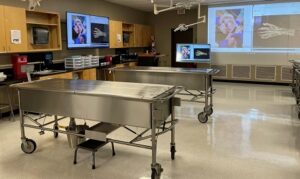
State-of-the-Art Physician Assistant Program Labs
Work and relax in our newly remodeled facilities and get hands-on experience with the tools and technology you’ll use every day in your physician assistant career. Enjoy exclusive, private 24/7 access to labs, lounges, study spaces, and a cutting-edge full-dissection cadaver lab.
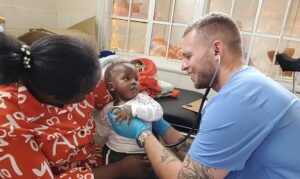
Building Community
As a Master of Physician Assistant Studies student, you will join a thriving community of caring and dedicated peers and alumni. The top physician assistant careers require experience working as a team member. That’s why we encourage collaboration both inside the classroom and in the field providing healthcare to those who need it most.
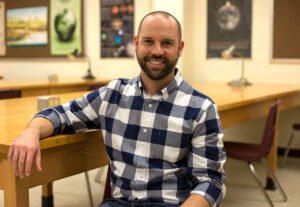
Chad Walters' Story
- Master of Physician Assistant
"I have had such a great experience with the faculty and staff here. They are very accessible and bend over backward to support their students."
Read full storyWhat Can You Do With a Master of Physician Assistant Degree?
Physician Assistants work in a variety of exciting fields of practice—including primary care, psychiatry, surgery, family medicine, and emergency medicine. Past Physician Assistant program graduates have gone on to work at prestigious facilities, such as Johns Hopkins University Medical Center, Texas Children’s Hospital, Baylor Scott & White Hospital, Covenant Hospital, and Hendrick Hospital.
After graduating from HSU’s Physician Assistant program, students are qualified to take the National Commission on Certification of Physician Assistants (NCCPA) Physician Assistant National Certifying Exam (PANCE).
On top of the personal and professional satisfaction from helping others every day, graduates also benefit from amazing job security. According to the Bureau of Labor Statistics (BLS), physician assistant career roles are expected to grow 27% over the next decade (average growth rate for all occupations is 3%). There has never been a better time to begin a physician assistant career.
Jobs for Physician Assistant Program Graduates
- Emergency room physician assistant
- Surgical physician assistant
- Primary care physician assistant
- Medical specialty physician assistant
- Physician assistant educator
Salary for Physician Assistant Program Graduates
According to the BLS, physician assistants earn an average salary of $126,000 a year.
Program Details
The Accreditation Review Commission on Education for the Physician Assistant, Inc. (ARC-PA) has granted Accreditation-Continued status to the Hardin-Simmons University Physician Assistant Program sponsored by Hardin-Simmons University. Accreditation-Continued is an accreditation status granted when a currently accredited program complies with the ARC-PA Standards.
Accreditation remains in effect until the program closes or withdraws from the accreditation process or until accreditation is withdrawn for failure to comply with the Standards. The approximate date for the next validation review of the program by the ARC-PA will be March 2032. The review date is contingent upon continued compliance with the Accreditation Standards and ARC-PA policy.
The program’s accreditation history can be viewed on the ARC-PA website at https://www.arc-pa.org/wp-content/uploads/2023/08/Accreditation-History-Hardin-Simmons-U-272.pdf
The Master of Physician Assistant curriculum is delivered on a full-time basis for a total of 27 months. Students matriculate as a cohort (30 students) into a 12-month academic phase (didactic), followed by 13 months of clinical education. Final semester (2 months) is didactic.
All courses and course descriptions for the Master of Physician Assistant can be found in the Graduate Catalog.
Several indicators of performance are used to determine a student’s readiness to move forward from the didactic to the clinical phase of the curriculum and to graduate from the PA program. These indicators include required courses completed; grade point average achieved; skills proficiencies attained; demonstration of professionalism; completion of 50 volunteer hours; results of comprehensive knowledge and skills testing, and completion of all requirements for the Capstone Research Project. Please refer to the student handbook for information regarding course progression and academic policy details.
Students who have been recommended for graduation by the HSU PA Program Grading and Promotions Committee will be awarded the Master of Physician Assistant degree provided they have met all of the following conditions and adhere to the policies outlined in the PA student handbook and the Hardin-Simmons University Graduate handbook.
Requirements for Graduation:
- Satisfactory completion of 21 courses during the didactic phase of the curriculum earning 53 credit hours and achieving a minimum overall 3.0-grade point average (GPA).
- Satisfactory completion of all 10 clinical rotations and three additional post-clinical courses for a total of 13 courses, earning 59 credit hours and achieving a minimum overall 3.0-grade point average (GPA).
- Satisfactory completion of three formative Objective Structured Clinical Examinations (OSCE) during the clinical phase of the curriculum.
- Documentation of competency of all required technical skills within the didactic and clinical phases of training as denoted by instructional or principal faculty.
- Satisfactory completion of course requirements for the Capstone Research project.
- Satisfactory demonstration of the ethical, professional, behavioral, and personal characteristics as documented on the professionalism evaluation forms listed below.
- End of semester professional evaluation forms during the didactic year,
- Preceptor evaluation forms during the clinical year, and
- Satisfactory completion of all summative assessment components administered within 4 months before graduation from the program with a grade of 70% or greater.
- Summative OSCE,
- End of Curriculum (EOC) written examination, and
- Clinical & technical skills assessment
- Completion of a minimum of 50 hours of community service of which 20 hours must be completed by the end of the didactic year.
- Completion of a diploma card with the Hardin-Simmons University Registrar’s office.
- Satisfactory payment of all fees due to the University and meets all requirements for commencement per University policy.
- Completed any terms of Academic Probation and/or Remediation if applicable.
Students unable to fulfill these requirements by the day of graduation will not be allowed to participate in the commencement ceremony without the permission of the PA Program Director. Students will not be considered graduates in any capacity until they have completed all of the above requirements.
The Hardin-Simmons University physician assistant program is dedicated to academic excellence in medical education. Our mission is to develop and prepare compassionate, professional PA providers who are committed to life-long leadership, learning, and community service. Our graduates will work as part of the healthcare team to deliver exceptional healthcare to rural West Texas and under-served communities worldwide.
Physician Assistant Program Goals
- Recruit outstanding PA students that display a commitment to community service.
- Prepare PA students for the practice of medicine as exemplified by:
- Pass rate on National Certifying exam that exceeds national average.
- Attainment of employment after graduation.
- Provide training opportunities for PA students in rural and underserved medical settings.
Progress Towards Goals Achievement
GOAL #1
- Recruit outstanding PA students that display a commitment to community service.
The following is data on the recruitment of outstanding PA students and their commitment to community service.
| Overall GPA AVG | Overall Science GPA AVG | Overall Non-Science GPA AVG | Quant GRE Score AVG | Written GRE Score AVG | Verbal GRE Score AVG | Average Pre-Admission Volunteer Hours | |
| Class of 2019 | 3.60 | 3.50 | 3.72 | 152.90 | 3.87 | 152.00 | 277 |
| Class of 2020 | 3.65 | 3.63 | 3.67 | 151.77 | 3.95 | 153.23 | 592 |
| Class of 2021 | 3.71 | 3.65 | 3.65 | 153.14 | 4.03 | 154.00 | 434 |
| Class of 2022 | 3.58 | 3.45 | 3.71 | 152.33 | 4.02 | 153.17 | 591 |
| Class of 2023 | 3.67 | 3.61 | 3.75 | 151.41 | 4.02 | 152.55 | 479 |
| Class of 2024 | 3.64 | 3.54 | 3.77 | 153.19 | 4.15 | 153.29 | 373 |
| Class of 2025 | 3.69 | 3.61 | 3.77 | 150.13 | 3.90 | 151.00 | 773 |
| Average | 3.65 | 3.57 | 3.72 | 152.12 | 3.99 | 152.75 | 502.71 |
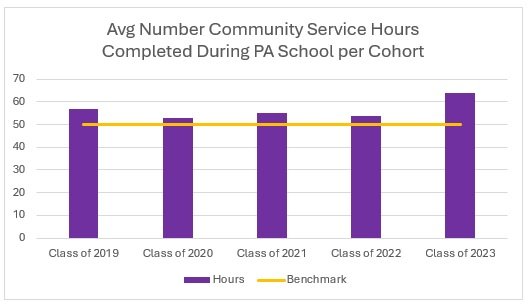
*Note all students must complete a minimum of 50 hours of community service during enrollment at the HSU PA program.
GOAL #2
- Prepare PA students for the practice of medicine as exemplified by:
- Pass rate on National Certifying exam that exceeds national average.
The first five graduating cohorts have exceeded the national average on the national certifying examination, and the HSU PA program has a five-year first-time taker average pass rate of 97% which exceeds the national five-year first-time average rate of 93%.
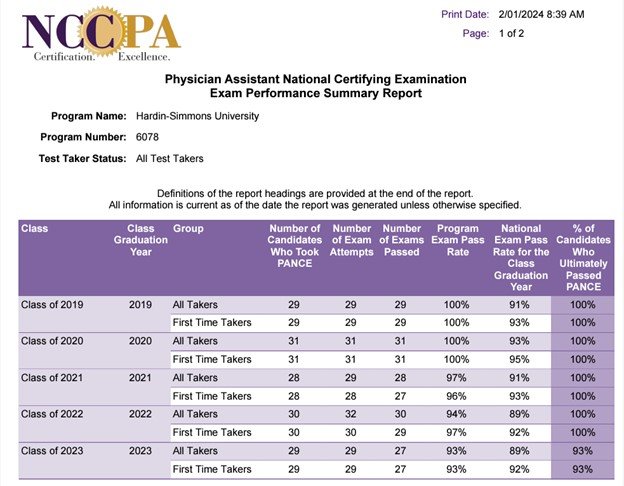
- Prepare PA students for the practice of medicine as exemplified by:
- Attainment of employment after graduation.
| Class of 2019 | Class of 2020 | Class of 2021 | Class of 2022 | ||||
| Percentage of graduates employed* | 100% | 100% | 100% | 100% | |||
*Percentage based on survey results of graduates desiring employment. Data verified with follow-up.
GOAL #3
- Provide training opportunities for PA students in rural and underserved medical settings.
Every PA student is required to complete a minimum of one clinical rotation in a rural or medically underserved area. Below is a tabular graphic demonstrating the number of clinical rotations completed in rural and underserved areas per cohort.
| Clinical Rotations in Rural or Underserved Area | |||||
| Class of 2019 | Class of 2020 | Class of 2021 | Class of 2022 | Class of 2023 | |
| Number of students | 29 | 31 | 27 | 30 | 29 |
| Minimum number or rotations in rural / underserved area | 29 | 31 | 27 | 30 | 29 |
| Additional rotations completed in rural / underserved area | 26 | 46 | 37 | 39 | 14 |
| Percentage above minimum goal | 90% | 148% | 137% | 130% | 52% |
Every cohort has exceeded the minimum requirement thereby allowing our students to have the opportunity to learn in rural and underserved communities.
HSU PA Student Attrition Table
| Graduated Classes | |||||
| Class of 2019 | Class of 2020 | Class of 2021 | Class of 2022 | Class of 2023 | |
| Maximum entering class size (as appropriately approved by ARC-PA) |
30 | 30 | 30 | 30 | 30 |
| Entering class size | 30 | 31 | 30 | 30 | 30 |
| Graduates | 29 | 31 | 28 | 28 | 29 |
| *Attrition rate | 3% | 0% | 7% | 7% | 3% |
| **Graduation rate | 97% | 100% | 93% | 93% | 97% |
*Attrition rate calculation: Number of students who attritted from cohort divided by the entering class size.
**Graduation rate: Number of cohort graduates divided by the entering class size.
Prerequisites must be completed prior to matriculation.
| Course | Hours |
| Human Anatomy & Physiology I and II with lab (must be taken at the same institution) | 8 |
| OR Human Anatomy with lab (4 hours) AND Human Physiology with lab (4 hours) | |
| Biology with lab x 2 | 8 |
| Chemistry with lab | 4 |
| English | 3 |
| Microbiology with lab | 4 |
| Organic Chemistry with lab | 4 |
| Psychology | 3 |
| Sociology OR an additional Psychology course | 3 |
| Statistics or Biostatistics | 3 |
| Other Requirements | |
| Bachelor’s degree from a regionally accredited college or university | |
| Overall GPA minimum (as calculated by CASPA) | 3.0 |
| Overall Science GPA minimum (as calculated by CASPA) | 3.0 |
| Required: Letters of Recommendation (3) | Minimum of three |
| Recommended: PA-CAT Examination | |
Beginning with the 2024-2025 application cycle, all applicants to the Hardin-Simmons University Physician Assistant program are encouraged to take the Physician Assistant College Admission Test (PA-CAT). The PA-CAT is a 240-item assessment covering nine (9) science subject areas. Currently, the test results are not used for admission decision-making, instead the program is collecting data on how best to implement score results to use in our admission process. Additional information on the PA-CAT can be found at https://www.pa-cat.com/
Beginning with the 2024-2025 application cycle, the Hardin-Simmons University Physician Assistant program no longer requires the GRE.
Applicant Selection Factors
Below are the application selection factors for applicants to the Hardin-Simmons University Physician Assistant program. Outstanding performance in any one category does not guarantee an interview nor does it guarantee acceptance into the program.
Application Review
In reviewing applications for interview selection and acceptance, a holistic review process is utilized that evaluates multiple factors to examine and evaluate qualities that an applicant could bring to the program.
Those factors include:
- Academic performance
- Overall GPA as calculated by CASPA
- Science GPA as calculated by CASPA
- Healthcare Experience
- Volunteer Hours
- PA Shadowing Hours
- Personal Statement
- Letters of Recommendation
Interview Review
At the interview, candidates will be evaluated on skills most likely to make them successful PA students including communication, professionalism, leadership potential, readiness to enter graduate school, problem solving, and knowledge of the profession.
Admission and enrollment practices that favor specified individuals or groups:
As noted in the FAQ section, HSU alumni and currently enrolled degree-seeking students who meet published requirements are granted an automatic interview; however, an automatic interview does not guarantee selection or favor an individual for admission beyond the interview stage.
Equal Opportunity
The Hardin-Simmons University Physician Assistant program welcomes applications regardless of race, color, national origin, religion, sex, or age. Our commitment to equal opportunity includes nondiscrimination on the basis of sexual orientation.
What is Hardin-Simmons University’s program accreditation status?
The Accreditation Review Commission on Education for the Physician Assistant, Inc. (ARC-PA) has granted Accreditation-Continued status to the Hardin-Simmons University Physician Assistant Program sponsored by Hardin-Simmons University. Accreditation-Continued is an accreditation status granted when a currently accredited program is in compliance with the ARC-PA Standards.
Accreditation remains in effect until the program closes or withdraws from the accreditation process or until accreditation is withdrawn for failure to comply with the Standards. The approximate date for the next validation review of the program by the ARC-PA will be March 2032. The review date is contingent upon continued compliance with the Accreditation Standards and ARC-PA policy.
The program’s accreditation history can be viewed on the ARC-PA website at https://www.arc-pa.org/wp-content/uploads/2023/08/Accreditation-History-Hardin-Simmons-U-272.pdf
How long is the Hardin-Simmons University Physician Assistant program?
The Hardin-Simmons Physician Assistant Program is a 27 month in-person program.
Does Hardin-Simmons University have a supplemental application or supplemental fee?
HSU does not require either a supplemental application or supplemental fee.
Does HSU have Rolling Admissions and what does that mean?
Yes, HSU does have a rolling admission process. Rolling admissions means that interviews are being conducted and admission decisions are being made while applications are still being accepted.
When do most applicants submit their application?
The CASPA application cycle opens in April. We do not review applications until verified by CASPA. All applications must be listed as “verified” in CASPA by the program’s deadline of October 1 to be considered.
How do I know if my courses meet the program’s prerequisite criteria?
Transcripts or planned coursework will not be reviewed for course equivalency prior to or during the CASPA application process. Guidance on prerequisites will not be provided until all prerequisites have been reviewed following the interview.
Is there a preference for residents of the state of Texas?
No. Hardin-Simmons University is a private university, and no preference is given for applicants residing in the state of Texas. Tuition for the PA Program is the same for in-state and out of state students.
Do students from HSU or others receive special consideration?
Yes – Current HSU degree-seeking students or HSU alumni receive an automatic interview if they meet the minimum criteria. Note, an interview does not guarantee acceptance.
What are the factors that affect your admissions decisions?
We consider the following factors in making admission decisions: academic performance, cumulative grade point average (GPA), science grade point average (GPA), clinical experience (including level of responsibility and number of hours), PA shadowing experience, personal statement, reference letters, volunteer hours, fit with HSU’s mission, leadership, and interview performance.
How can I make my application stand out from the rest?
Applications are holistically reviewed, meaning all elements are considered for eligible applications that meet our minimum overall CASPA calculated GPA requirement of at least a 3.0 and a CASPA calculated Science GPA of 3.0. In addition to previous academic performance and pre-admission clinical experience, these include personal statement, letters of recommendation, PA shadowing experience, volunteer or community service, leadership experience, challenging course work, academic performance, and fit with HSU mission. Competitive applicants stand out by being able to speak to each of these categories.
Does it matter what your academic major is from undergrad?
No. Applications are reviewed holistically, and no specific academic major is preferred from undergraduate or graduate school experiences.
Can I send additional letters of recommendation, beyond those included in CASPA?
No, only three letters of recommendation included in the CASPA application submission are required. Additional letters of recommendation sent directly to the program will not be considered as part of your application.
Who are members of the Admissions Committee and who makes the final decision?
The Admissions Committee consists of the PA program faculty and staff. Final admission decisions are made by the PA Program Director and PA program faculty.
Is the GRE required or accepted?
As of the 2024-2025 admission cycle, the HSU PA program no longer requires the GRE. We also are not accepting GRE score submissions as they are not considered in the admission decision-making process.
Is the PA-CAT required?
As of the 2024-2025 application cycle, all applicants to the Hardin-Simmons University Physician Assistant program are encouraged to take the Physician Assistant College Admission Test (PA-CAT). The PA-CAT is a 240-item assessment covering nine (9) science subject areas. Currently, the test results are not used for admission decision-making, instead the program is collecting data on how best to implement score results to use in our admission process. Additional information on the PA-CAT can be found at https://www.pa-cat.com/
Can I apply before I complete all the prerequisites?
Yes. When completing your CASPA application, include courses in progress and coursework planned in the appropriate fields to alert us to your plans. If you are accepted into the Program before you complete the required coursework, your acceptance will be on provisional status until records of your coursework and/or graduation are received. No student will be allowed to matriculate into the Program if prerequisite requirements are not met.
If I took a prerequisite course 5, 10, even 35 years ago, will you still accept that?
Yes. We do not impose an expiration date on prerequisite coursework.
Does HSU PA Program accept prerequisites from community colleges?
Yes. We accept prerequisites from a regionally accredited institution of higher learning.
Does HSU PA Program accept prerequisite online classes and labs?
Yes. If online classes/labs are from any regionally accredited college/university.
Will PASS/FAIL prerequisites be accepted when I apply?
If your PASS/FAIL course was taken during the COVID-19 pandemic (during the calendar year 2020 and 2021), it will be accepted as a prerequisite; however, the grade will not be factored into your GPA. PASS/FAIL courses taken outside of the COVID-19 pandemic dates listed above will not be accepted.
Can prerequisites be waived or tested out of with CME or CEU credit?
Prerequisites cannot be waived for the Hardin-Simmons University PA Program. No prerequisite can be waived due to previous academic, life, or field experiences. Prerequisites can be completed at any regionally accredited institution of higher learning. College credit must be earned and displayed on transcripts for prerequisites. Prerequisites cannot be satisfied through Continuing Medical Education or Continuing Education Unit credit.
What is your policy regarding advanced placement in PA school?
Hardin-Simmons University PA Program does not grant advanced placement in their PA Program to any matriculating student. No previous coursework will substitute for any PA courses and the program must be completed in totality.
Does HSU PA Program accept AP or CLEP for prerequisites?
Yes. If a regionally accredited undergraduate college/university has granted AP or CLEP credit for a prerequisite course and it is displayed on the student’s transcript.
Is a background check required?
Yes. Accepted students are subject to a criminal background check and drug screen preceding orientation. Should the background check or drug screen yield any undisclosed and/or disqualifying information, the offer of admission may be revoked.
Do you accept transfer students, or provide credit for experiential learning?
No. The PA Program does not accept transfer students from other PA Programs and all students must have a bachelor’s degree or higher from a regionally accredited college or university in the United States prior to starting the PA Program. The PA Program does not allow course credit for experiential learning.
Can I apply if I have not yet completed my undergraduate degree?
Yes. You can begin to apply the year prior to graduation, if you successfully graduate by the time of the PA program’s start date in August. You must have obtained your bachelor’s degree prior to matriculation into the program and completed all prerequisite coursework successfully.
Is there a minimum number of contact hours for patient care and how should I list my experiences?
Hardin-Simmons University PA program does not have a minimum number for patient contact hours or health related experience. Where you choose to list your experience is a personal decision and you can seek input from CASPA directly. We review all applications holistically and both categories are considered. We discourage applicants from listing the same experience in two categories as this can be viewed as fraudulent.
How should Volunteer hours be entered if they are Patient Care Experience?
Please follow CASPA’s directions on how/where to list experiences. We discourage applicants from listing the same experience in two categories as this can be viewed as fraudulent.
Does the PA Program offer applicant assistance in finding clinical work or shadowing experience?
No, due to a high volume of applicants, we cannot offer assistance to candidates looking for clinical or shadowing experience.
Once I submit all my application materials, how long before I hear if I will receive an interview?
The HSU PA program uses a rolling admission process without a specific timeline for notification.
Can I send my application materials directly to the program?
No. All application materials must be submitted directly through CASPA. Contact CASPA at CASPA@PAEAonline.org or view the website https://paeaonline.org/resources/member-resources/caspa for questions regarding their application process. Documents sent directly to the HSU PA program will not be accepted or reviewed.
Where are clinical rotation sites located?
We offer our students a wide variety of experiences in various types of clinical settings, including hospitals, small and medium size clinics, private offices and rural opportunities. Our clinical team assigns those locations with input from each accepted student. Clinical rotation assignments are subject to availability at the time of assignment.
What is the cost of tuition?
Tuition and fees for the PA Program is updated on the HSU PA web page yearly under the “Tuition and Fees” tab at the bottom of the page.
After graduating from this program, will I be able to work in Texas or other U.S. states?
Graduation from this accredited program allows you to apply for licensure in all 50 states along with allowing graduates to sit for the national certification examination (required passage for licensure in most states). Each state has different licensure requirements.
Are there scholarships I can apply for?
Once an applicant has been accepted into the program and is officially a Hardin-Simmons University student, they may apply for available institutional scholarships through Scholarship Central at https://hsutx.scholarshipuniverse.com/ using their official HSU student account log in information. Additionally, the Chair of the PA Program Scholarship Committee will notify students as soon as any internal PA Program scholarships become available. The HSU PA program has recently received a $2 million endowment dedicated to supporting and empowering future generations of physician assistant students. This significant contribution will not only enhance our student’s education but it will also ensure the continued excellence and advancement of the Physician Assistant program at HSU.
Will international course work meet the prerequisite criteria?
Only coursework earned from a regionally accredited U.S. college or university will be accepted as prerequisite application requirements. Listed below are the 7 USDE recognized regional accreditation agencies.
- For applicants with multiple degrees, at least a bachelor’s degree or higher must be from a regionally accredited college or university.
Use the following links to verify if the institution you attended (bachelor’s degree or higher) is a regionally accredited college or university:
- Middle States Commission of Higher Education (MSCHE)
- New England Association of Schools and Colleges, Commission on Institutions of Higher Education (NEASC-CIHE)
- The Higher Learning Commission (HLC)
- Northwest Commission on Colleges and Universities (NWCCU)
- Southern Association of Colleges and Schools Commission on Colleges (SACS)
- The Accrediting Commission for Community and Junior Colleges, Western Association of Schools and Colleges (ACCJC)
- WASC Senior College and University Commission
In order to ensure that patients receive the best medical care possible, the faculty have identified certain skills and professional behaviors that are essential for successful progression of PA students in the Program. A student must possess skills and behaviors at a level of capability to perform a variety of duties required of a PA as a healthcare professional. Students with disabilities who can perform these skills and successfully execute professional behavior either unassisted, with dependable use of assistive devices, or by employing other reasonable accommodations are eligible to apply for enrollment in the Program.
Minimum performance standards include critical thinking, communication skills, observation skills, motor skills, and interpersonal abilities. These following descriptions define the capabilities that are necessary for an individual to successfully complete the Hardin-Simmons University Physician Assistant curriculum.
Intellectual Capability/Critical Thinking: The PA student must possess the intellectual, ethical, physical, and emotional capabilities required to undertake the full curriculum and to achieve the levels of competence in critical thinking and problem solving required to seek entry to the profession. The ability to solve problems, a skill that is critical to the practice of medicine, requires the intellectual abilities of measurement, calculation, reasoning, analysis, and synthesis. Students in the Program must be able to demonstrate these skills in working with patients, their families, and other members of the healthcare team. Intellectual abilities also encompass learning and retaining information and the ability to make decisions in a timely manner.
Communication Skills: The PA student must be able to effectively speak, to hear, and to observe patients in order to elicit information, describe changes in mood, activity and posture, and to perceive nonverbal communications. The student must be able to communicate attentively, effectively, sensitively and efficiently in oral, written, and electronic forms with other clinicians, families, and patients in order to make appropriate and timely responses.
Observation Skills: The PA student must be able to observe a patient accurately, both at a distance and close at hand. Students must possess sufficient visual, auditory, and tactile sensation to receive appropriate information in the classroom, laboratory, and other educational and clinical settings. Sensation must be satisfactory to receive verbal and nonverbal communications from patients and others, and to perform inspection, auscultation and palpation techniques during the physical examination.
Motor Skills: The PA student should have sufficient strength and coordination to perform the activities required of a Physician Assistant. The student should have sufficient motor coordination to move about patient care environments and sufficient dexterity to use common medical instruments. Students must have sufficient stamina to sit, stand, and move within classroom, laboratory, examination rooms, treatment rooms and operating rooms for long periods of time. Students must also be able to calibrate and use large and small equipment and execute movements required for moving patients, positioning patients, and providing care to patients routinely and in emergency settings. Typical lifting requirement is a minimum of 50 lbs. unassisted.
Interpersonal Abilities: The PA student must possess the ability to establish and maintain appropriate professional relationships. The student must possess the emotional health required for full utilization of his or her intellectual abilities, the exercise of good judgment, the prompt completion of all responsibilities required for the diagnosis and care of patients, to be compassionate, empathetic, responsible, and tolerant toward patients, families and colleagues. This also includes the ability to prioritize competing demands and function in stressful circumstances.
Preceptor FAQs
- What is the length or number of hours the student would be at our facility?
Each student clinical rotation is a 5-week rotation. The student schedule (days, hours, shifts, etc) is dependent on the provider’s schedule for the 5-week duration.
- When can I expect the student to rotate at my clinical site?
The HSU PA Clinical Coordinator works closely with all preceptors and clinical sites to determine the best time to place a student. Clinical rotations are scheduled as 5-week date ranges, with clinical preceptors selecting the date ranges that best fit their schedules. If at any time the provider is unable to take a student at a previously scheduled time, please notify the program as soon as possible so alternative placements can be made.
- What are the required documents to be a clinical preceptor?
Prior to placing a student at a clinical site, an active affiliation agreement between the HSU PA program and the facility must be in place. Here is a sample affiliation agreement. If it is a group practice/site, the affiliation will be with that group. If it is a private practice, the affiliation will be with the practice. If the provider provides care at a local hospital(s), we also require an affiliation agreement to be in place with the hospital(s). HSU utilizes a standard affiliation agreement for all clinical sites, but if the partnering facility has one, we are happy to review it to determine if it will satisfy all our requirements.
In addition, a Letter of Intent is needed from the provider (provided by HSU PA program). Please note a Letter of Intent does not oblige the provider to take students, it only notifies us of your interest.
Finally, all clinical preceptors must provide a copy of the current curriculum vitae (CV) or resume, a copy of their board certification, and a copy of the current license.
- Will PA students need access to our patient charts?
Yes, students will need access to patient charts because they will be seeing patients during their rotations. This can be electronic and/or paper. All students will have completed extensive training in HIPAA compliance prior to starting their clinical year.
- Upon completion of the student’s rotation, what is required from the preceptor?
Halfway through the clinical rotation, we ask each clinical preceptor to submit a mid-rotation preceptor evaluation form. This allows the preceptor to communicate with the program how a student is performing and to intervene should improvement be required.
At the end of the clinical rotation, the clinical preceptor will complete an end-of rotation final preceptor evaluation of the student. The final preceptor evaluation directly correlates to the learning outcomes found in the course syllabus. The final preceptor evaluation comprises 25% of the student’s final grade in the course. For additional information regarding the final preceptor evaluation, please refer to the Preceptor Guide to End-of-Rotation Evaluation document.
- Is there a stipend for being a clinical preceptor?
Yes, we are pleased to offer a stipend for our clinical preceptors who are willing to precept a minimum of three (3) clinical students per clinical year. Clinical preceptors must complete and submit required documentation to receive the stipend. For more information, contact our program Clinical Coordinator, Esther Castilleja at esther.castilleja@hsutx.edu
- Can I claim Category I continuing medical education (CME) hours for precepting?
Yes, HSU PA program has partnered with AAPA to award AAPA Category I CME for PA clinical preceptors. Your AAPA Category I CME is awarded at a rate of 2 CME per PA student per 40-hour week, without limit.
- Is there a title given by the HSU PA program for precepting?
Yes, in recognition of our ongoing appreciation of the service provided to our students, we give titles and recognitions based on the number of students a preceptor takes per cohort. We highly encourage you to add these titles to your curriculum vitae/resume. Preceptors who precept one or two students per cohort are given the title Clinical Instructor. Preceptors who precept three to four students per cohort are given the title Recognized Clinical Instructor. Preceptors who precept five or more students are given the title Distinguished Clinical Instructor.
| Number of Students Precepted | Title |
| 1-2 | Clinical Instructor |
| 3-4 | Recognized Clinical Instructor |
| 5+ | Distinguished Clinical Instructor |
The following policies, in full, can also be found in the HSU PA Student Handbook at the pages listed in the table.
| Description for Website | Standard | Handbook Policy | Page Number |
| Discrimination & Harassment Policy (Title IX = 37) | A1.02 j | DISCRIMINATION / HARASSMENT POLICY
The Hardin-Simmons University PA program has a zero-tolerance policy for discrimination and harassment. Any student, faculty, or staff member is obligated to report incidences witnessed or observed. Whistle blower protection is in place to protect against retaliation. Reports will trigger automatic investigations. Unacceptable conduct includes but is not limited to the following: • Physical harm (e.g., hitting, slapping, kicking) or threats of physical harm • Requests for performing personal services (e.g., shopping, babysitting) • Making unwanted sexual advances • Exchanging sexual favors for grades or other rewards • Discrimination or harassment based on gender, race/ethnicity, sexual orientation, or religion • Being subjected to offensive remarks / names based on gender, race/ethnicity, sexual orientation, or religion • Public embarrassment/humiliation specifically based on gender, race/ethnicity, sexual orientation, or religion • Denied opportunities for training or awards based on any of the above protected categories (note training opportunities are based upon preceptor availability) • Receipt of lower grades/evaluations based on protected categories as listed above. For more information refer to the university harassment and Title IX policies which can be found at the HSU website https://www.hsutx.edu/title-ix/ |
P 31
(Title IX = 37) |
| Deposit Refunds | A1.02 k | Tuition, Fees and Other Expenses: The University reserves the right to change tuition and other charges at the beginning of any semester. The tuition cost for a full-time course load does not include expenses for required items such as textbooks, medical equipment and supplies, laboratory fees, and clinical tracking software fees.
PA students are not eligible for part-time enrollment unless a specific degree plan is approved as part of a remediation plan after matriculation. In-state and out-of-state tuition are the same. Deposit: There is a non-refundable $1200.00 deposit, subject to change, for those applicants accepted into the Hardin-Simmons University Physician Assistant Program, which is applied to the tuition for the first semester upon enrollment. If an applicant accepted into the Program encounters circumstances that prevent their matriculation, any amount paid by the applicant to the University that is over and above the non-refundable deposit of $1,200 will be refunded based on the tuition refund policy set forth by the University and outlined in the University student catalog. |
P 22 |
| Clinical Site/Preceptor Recruitment | A3.03 | PRECEPTOR POLICY: Students must not be required to provide or solicit clinical sites or preceptors. Hardin-Simmons University PA Director of Clinical Education and Clinical and Technology Coordinator must coordinate clinical sites and preceptors for the Program required rotations. | P 74 |
| Student Work Policy | A3.04 | Students may not be employed by the PA Program. While a student may be invited by a faculty member to volunteer to share their expertise in a specific area with the class, a student may not substitute for or function as instructional faculty and cannot be compelled to share any previous experience with the class. Also, during supervised clinical experiences, students may not substitute for clinical or administrative staff at the clinical site or for the preceptor. | P 31 |
| Student Teaching Policy | A3.05 a & b | Students may not be employed by the PA Program. While a student may be invited by a faculty member to volunteer to share their expertise in a specific area with the class, a student may not substitute for or function as instructional faculty and cannot be compelled to share any previous experience with the class. Also, during supervised clinical experiences, students may not substitute for clinical or administrative staff at the clinical site or for the preceptor. | P 32 |
| Clinical Student Identification | A3.06 | IDENTIFICATION:
All students will be provided with a University identification badge, including name and photo, clearly identifying each student as a Hardin-Simmons University Physician Assistant (PA) student. Students are required to wear these badges at all times when participating in PA professional functions such as a health fair or when in patient care areas. In clinical practice settings, students must identify themselves as PA students to patients and healthcare practitioners. This badge must be returned to the Program upon graduation or after withdrawal from the Department of Physician Assistant Studies. The first ID badge is free. Replacement badge is $15. |
P 27 |
| Student Immunization, Health Screening, and International Travel | A3.07 a & b | HEALTH, IMMUNIZATIONS AND HEALTH INSURANCE:
As part of the matriculation process into the PA Program, the Department of Physician Assistant Studies requires all students to meet the health and immunization requirements listed in Appendix B of this document. If a student chooses not to be vaccinated or tested, they will forfeit their seat in the program. Immunizations will not be required if the student has a specific medical contraindication to the required vaccine(s). Students must provide documentation from their healthcare provider of any adverse reaction or contraindication to a required vaccine(s). Hardin-Simmons University PA Program immunization policy is aligned with the Centers for Disease Control and Prevention (CDC) Immunization of Health-Care Personnel: Recommendations of the Advisory Committee on Immunization Practices (ACIP). Prior to matriculation in the Program, all students must complete the Hardin-Simmons University PA Program Immunization Verification Document and Health Clearance Form, have a physical examination by a healthcare provider, and have their healthcare provider complete the attestation form of fitness to proceed in the PA Program (located at the end of this handbook, Appendix B & C). Official documents must be completed by a medical provider that is not related to you. Additionally, proof of personal health insurance must be provided prior to matriculation and maintained throughout the Program. The Hardin-Simmons PA program’s clinical sites all require the immunizations listed on the Immunization Verification Document. Unless there is a documented medical contraindication, all students must have these vaccines in order to complete the program. Immunizations will not be required if the student has a specific medical contraindication to the vaccines listed. Students must provide documentation of any adverse reaction or contraindication to a vaccine required. In addition, a licensed medical provider should certify the contraindication. Again, the form cannot be completed or signed by a family member who is in the medical field. Various clinical training sites may require additional immunizations, evidence of testing, or titers prior to rotations, to include COVID-19. Fulfillment of these requirements, and any associated costs, will be the student’s responsibility. If students choose not to be vaccinated or tested, they will not be allowed to rotate at clinical sites that require the additional immunization(s) and/or testing. Inability to rotate at clinical sites due to noncompliance with required immunizations/testing is not the responsibility of the program. If the student is voluntarily non-compliant with rotation site policies for screening/immunizations on all rotations, graduation will be delayed, or the student may be ineligible for graduation from the PA Program. Immunizations will not be required if the student has a specific medical contraindication to the vaccines listed. Students must provide documentation from a healthcare provider of any adverse reaction or contraindication to a vaccine required. PA student health records are confidential and will not be accessible to, or reviewed by, Program, Principal Faculty, instructional faculty, Medical Director, or staff except for immunization and tuberculosis screening results which may be maintained and released with written permission from the student. Recommendations may vary for pregnant women and those with health conditions or allergies. Please refer to your healthcare provider or CDC website for updates and clarifications regarding specific immunization requirements Please contact your health care provider and/or refer to CDC websites below for updates and clarifications regarding specific immunization requirements. http://www.cdc.gov/vaccines/adults/rec-vac/hcw.html International Mission Immunization Requirements: In addition to the above health and immunization requirements for all HSU PA students, there will be supplementary immunization and health requirements for students going to international missions. These immunizations will be at the student’s expense. This will include any routine and required immunizations and health recommendations for the country as recommended by the Centers for Disease Control and Prevention Travel Medicine website at: https://wwwnc.cdc.gov/travel/destinations/list Students traveling abroad will also be instructed to follow safety precautions for the country of interest which are available through the U.S. Department of State website: https://travel.state.gov/content/travel/en.html |
P 28 |
| Exposure to Infectious and Environmental Hazards Policy | A3.08 a, b, & c | INFECTIOUS DISEASE / ENVIRONMENTAL EXPOSURE:
The Hardin-Simmons University Department of Physician Assistant Studies has a commitment to protect the health and well-being of students, faculty, staff, and patients. As part of their training, students may encounter exposure to infectious and environmental hazards. This may include , but is not limited to, being exposed to human donors and preservative chemicals such as formalin in the anatomy lab, latex or other products such as gloves that may contain allergens, and exposure to communicable infectious disease which may be transferred in the classroom or clinical setting. PREVENTION: While the risk of transmission is small, the Program has a number of policies and procedures in place to minimize risk. It is the policy of the Hardin-Simmons University, Physician Assistant Program to follow the guidelines and recommendations made by the Centers for Disease Control and Prevention (CDC) and the Occupational Safety and Health Administration (OSHA) regarding standard precautions. Before beginning clinical education experiences through the HSU Physician Assistant Program, students will receive training regarding CDC standard precautions as well as OSHA training. Standard Precautions Standard Precautions combine the major features of Universal Precautions and Body Substance Isolation and are based on the principle that all blood, body fluids, secretions, respiratory particles, excretions, non-intact skin, and mucous membranes may contain transmissible infectious agents. Standard Precautions include a group of infection prevention practices that apply to all patients, regardless of suspected or confirmed infection status, in any setting in which healthcare is delivered. These practices include: 1. Hand hygiene 2. The use of personal protective equipment (PPE) In addition to Standard Precautions, students will receive training in the three categories of Transmission-Based Precautions: 1. Contact Precautions 2. Droplet Precautions 3. Airborne Precautions Transmission-Based Precautions are used when the route(s) of transmission is (are) not completely interrupted using Standard Precautions alone. Students may access details of this information at any time at the following website: http://www.cdc.gov/hicpac/2007IP/2007ip_part4.html Exposure to Blood Borne Pathogens: Strict adherence to standard precautions and other infection control measures should prevent a student’s exposure to blood borne pathogens. CARE AND TREATMENT AFTER EXPOSURE: Should a student sustain a possible exposure (including a needlestick injury) to blood borne or other infectious respiratory or contact pathogens during a clinical training experience, the student is responsible for immediately notifying their supervisor, instructor/preceptor, or department manager. The student should then follow the steps outlined in the section titled “Post-Exposure Procedure” and “Student Injuries or Exposures”. Exposure is defined as a demonstrated skin, eye, mucous membrane, or parenteral contact with blood or other potentially infectious materials. Follow this protocol IMMEDIATELY if you are experience a needlestick injury or are exposed to blood/bodily fluids while on your rotations: 1. Aggressive local wound care to the site of exposure should be initiated immediately. The site should be cleansed thoroughly with soap and water for at least 15 minutes using a surgical hand brush when possible. It may be beneficial to use an antiseptic such as chlorhexidine gluconate (Foam Carer CHG), an iodophor (EZ Scrub, Betadine), or Dakins solution (dilute 1:9 buffered sodium hypochlorite). Difficult to scrub areas should be soaked in chlorhexidine gluconate (Foam Carer CHG) or other antiseptic. Non-intact skin should be cleansed with soap and water for at least 15 minutes. It may be beneficial to use an antiseptic as described above. Mucous membrane exposures (e.g., eye splashes) should be irrigated thoroughly for at least 15 minutes with saline or tap water using the nearest eye washing station (or faucet if none available). 2. The incident MUST be reported immediately to the preceptor and/or department manager. 3. Student should seek immediate medical care at the nearest Emergency Room. Do not wait until the end of your shift. Students are responsible for all medical expenses related to a bodily fluid exposure. 4. Finally, the student must notify the Director of Clinical Education or if unavailable, the Clinical Administrative Coordinator or Program Director. In addition, the HSU Physician Assistant Program Incident Form must be completed and sent to the Program. (This form is located at the back of the handbook; Appendix D). More information can be found at: Preventing Needlesticks in Surgical Personnel | Blogs | CDC Student Injuries Incidents involving an injury to a student (such as a fall, or other accidental injury) or unexpected other pathogenic exposure during a clinical education experience will follow a similar protocol. 1. The injury/exposure should be reported to the student’s supervisor or clinical preceptor. 2. Students should report to the nearest Emergency Department for treatment 3. The Program should be notified as soon as it is possible to do so. The student must notify the Director of Clinical Education or the Clinical Administrative Coordinator. 4. In addition, the HSU Physician Assistant Program Incident Form, must be completed and sent to the Director of Clinical Education. Do not send copies of medical records. If a potentially infectious exposure occurs, do not allow feelings of embarrassment, a large workload, or misplaced peer pressures prevent you from reporting the event immediately. Needle sticks and other exposures can be life-threatening. Responsible healthcare providers recognize that unintentional injuries and occupational exposures may occur and must be evaluated by competent, objective, and experienced medical professionals. COVID-19 exposures are reported to the university directly through the Dean of Students’ office in addition to the above parameters. FINANCIAL RESPONSIBILITY: IMPORTANT: All charges incurred by PA students for healthcare visits, diagnostic studies, and prescribed medications related to an injury, needle stick, blood, or body fluid exposures are the student’s responsibility. Students must maintain health insurance throughout their educational experience at the Hardin-Simmons University Physician Assistant Program. All medical or healthcare services (emergency or otherwise) that the student receives or requires are the student’s financial responsibility and are at the student’s expense. |
P 61 |
| Provision of Healthcare | A3.09 | POLICY REGARDING FACULTY HEALTHCARE:
PA Program Principal Faculty, Instructional Faculty, the Program Director, and the Medical Director will not participate as healthcare providers for students in the Program. It is acceptable for healthcare to be provided in an emergency situation only until licensed emergency personnel arrives. Medical Services: Student health services are not available at the Hardin-Simmons University Physician Assistant Program nor on the main campus of Hardin-Simmons University for any HSU students. PA Students are required to have health insurance upon matriculation and must maintain active health insurance during their enrollment at Hardin-Simmons University Physician Assistant Program. Hendrick Medical Center is two blocks from campus and is available should an emergency arise. Hardin-Simmons University is not responsible for medical bills and does not supply prescription drugs or personal nursing/medical care. Students are required to show proof of their own private personal health insurance policy coverage prior to matriculation and again prior to beginning clinical rotations. |
P 27 |
| Referral to Student Services | A3.10 | Mental Health/Counseling:
The Office of Student Life offers free counseling services to students. No referral is necessary. Information about these services can be found at https://www.hsutx.edu/student-life/student-services/counseling-services/ Suicide hotlines are available 24 hours a day to students and links are made through these services to local providers on campus for interventions when needed. The National Suicide Prevention Hotline phone number is (800) 273-TALK (8255). |
P 28 |
| HSU PA Program Competencies | A3.12 g | HSU PA PROGRAM COMPETENCIES:
Upon completion of the program, students are expected to demonstrate competency in the following domains: 1. Medical knowledge, 2. Clinical reasoning and problem-solving abilities, 3. Clinical and technical skills, 4. Interpersonal skills, and 5. Professionalism. The HSU PA program defined competencies upon graduation are listed below. Course learning outcomes, instructional objectives, technical skill evaluations, and professional development throughout the curriculum are based on these program competencies. Syllabi throughout the curriculum reflect these program competencies and are incorporated in various components with the goal of preparing graduates for clinical practice. 1. Demonstrate acquisition of the medical knowledge required to integrate and apply basic medical sciences to care for patients in clinical settings. (medical knowledge) 2. Demonstrate a broad, systems-based knowledge of clinical medicine. (medical knowledge) 3. Understand, evaluate, and apply information regarding disease etiology, risk factors, epidemiology, and screening methods to detect conditions in symptomatic and asymptomatic individuals. (medical knowledge, clinical reasoning & problem solving) 4. Demonstrate evidence-based clinical reasoning and problem-solving skills required to integrate and apply basic medical sciences to care for patients in clinical settings. (clinical reasoning & problem solving) 5. Formulate differential diagnoses, accurate assessments, and appropriate treatment plans and interventions to care for patients. (clinical reasoning & problem solving) 6. Correctly interpret diagnostic and laboratory findings appropriate for primary care settings. (medical knowledge, clinical reasoning & problem solving) 7. Apply knowledge of responsible prescribing practices for patient care and safety, including display of comprehension of indications, contraindications, side effects, interactions, and adverse reactions related to pharmacologic agents. (medical knowledge) 8. Effectively communicate to patients test results, treatment plans, and health-related findings in a culturally sensitive manner while maintaining patient confidentiality. (interpersonal skills) 9. Effectively communicate patient information with other members of the healthcare team through oral delivery and written documentation. (interpersonal skills, clinical & technical skills) 10. Perform basic diagnostic and therapeutic procedures needed for the evaluation and treatment of a patient. (clinical & technical skills) 11. Demonstrate appropriate behavior, respect, and professionalism in the educational and clinical settings.(professionalism) |
P 9 |
Total Cost of the Program
The PA Program makes every effort to keep costs reasonable for students. However, because the Program runs continuously for twenty-seven months, applicants must review their financial resources carefully and anticipate expenses realistically. During the clinical education phase, all students may be assigned to clinical sites outside of the immediate Abilene / Big Country area. The student is responsible for the costs related to out-of-area travel and housing, if applicable.
The total tuition and fee cost of the Program is estimated at $90,485 – $116,610, depending on year of entry into the Program. Updated accurate tuition and fee costs are published on the university web site at www.hsutx.edu/pa. This does not include living expenses, textbook or equipment costs. The estimates for these costs vary based on student choice of housing, family size, transportation/vehicle cost, and technology related costs (laptop computer, data plan, and mobile phone required). Reliable transportation is required in the clinical year for commuting to supervised clinical practice experiences (SCPE).
Learn more about what makes up cost of attendance and how to request a cost of attendance adjustment when additional education-related expenses beyond a student’s standard COA are incurred.
Program Tuition & Fees
COHORT STARTING: 2022 Fall – Graduating 2024 |
|
| Tuition: $95,000 (entire program) + $9,100 (Estimated University Fees) = ~$104,100 | |
| *Breakdown of University Fees: | |
| Departmental Examination Fee (per semester) $40 | $280.00 |
| Departmental Laboratory Fee (per semester) $80 | $560.00 |
| General Student Fee (will vary per semester) Estimate of fee is $520.00/semester | $3,640.00 |
| Student Insurance Fee $40/year (3 years) | $120.00 |
| Clinical Placement fee ($500/clinical course x 9 courses) | $4,500 |
| Total University Fees: ~$9,100 | |
| *Breakdown of Non-University Fees: | |
| EXXAT Fees: $367.00 – one-time fee | $367.00 |
| Medical Terminology: $139.95 – one-time fee | $139.95 |
| American Academy of Physician Associates: $75.00 – one-time fee | $75.00 |
| Texas Academy of Physician Assistants: $25.00 – one-time fee | $25.00 |
| Background Checks: $72.00 + tax (for TX and NM residents) each – a minimum of 3 background checks per student | $216.00 |
| Drug Screens $29.00 + tax (for TX and NM residents) each – a minimum of 3 drug screens per student | $87.00 |
| Non-University Fees = ~$910 | |
*All fees are subject to change
| Total Estimated Tuition & Fees: ~$105,010 |
All tuition and fees are the same for Resident & Non-Resident students.
“Semester” for the PA Program means three (3) per year: Spring, Summer, Fall for a total of seven (7) semesters for the entire program.
Cost of books, equipment, and living expenses will vary based on individual student lifestyle choices. Electronic book options, purchase of used books, and/or rental of textbooks may offset costs.
| Estimated Textbook Expenses | $1200.00 — $4700.00 |
| Estimated Equipment Expenses | minimum $700.00 |
COHORT STARTING: 2023 Fall – Graduating 2025 |
|
| Tuition: $97,900 (entire program) + $9,100 (Estimated University Fees) = ~$107,000 | |
| *Breakdown of University Fees: | |
| Departmental Examination Fee (per semester) $40 | $280.00 |
| Departmental Laboratory Fee (per semester) $80 | $560.00 |
| General Student Fee (will vary per semester) Estimate of fee is $520.00/semester | $3,640.00 |
| Student Insurance Fee $40/year (3 years) | $120.00 |
| Clinical Placement fee ($500/clinical course x 9 courses) | $4500.00 |
| Total University Fees: ~$9,100 | |
| *Breakdown of Non-University Fees | |
| EXXAT Fees: $367.00 – one-time fee | $367.00 |
| Medical Terminology: $139.95 – one-time fee | $139.95 |
| American Academy of Physician Associates: $75.00 – one-time fee | $75.00 |
| Texas Academy of Physician Assistants: $25.00 – one-time fee | $25.00 |
| Background Checks: $72.00 + tax (for TX and NM residents) each – a minimum of 3 background checks per student | $216.00 |
| Drug Screens $29.00 + tax (for TX and NM residents) each – a minimum of 3 drug screens per student | $87.00 |
| *Non-University Fees = ~$910 | |
*All fees are subject to change
| Total Estimated Tuition & Fees: ~$111,910 |
All tuition and fees are the same for Resident & Non-Resident students.
“Semester” for the PA Program means three (3) per year: Spring, Summer, Fall for a total of seven (7) semesters for the entire program.
Cost of books, equipment, and living expenses will vary based on individual student lifestyle choices. Electronic book options, purchase of used books, and/or rental of textbooks may offset costs.
| Estimated Textbook Expenses | $1,200.00 — $4,700.00 |
| Estimated Equipment Expenses | minimum $700.00 |
COHORT STARTING: 2024 Fall – Graduating 2026 |
|
| Tuition: $102,800 (entire program) + $9,100 (Estimated University Fees) = ~$111,900 | |
| *Breakdown of University Fees: | |
| Departmental Examination Fee (per semester) $40 | $280.00 |
| Departmental Laboratory Fee (per semester) $80 | $560.00 |
| General Student Fee (will vary per semester) Estimate of fee is $520.00/semester | $3,640.00 |
| General Student Fee (will vary per semester) Estimate of fee is $1,100.00/semester | $7,700.00 |
| Student Insurance Fee $40/year (3 years) | $120.00 |
| Clinical Placement fee ($500/clinical course x 9 courses) | $4,500.00 |
| Total University Fees: ~$9,100 | |
| *Breakdown of Non-University Fees: | |
| EXXAT Fees: $367.00 – one-time fee | $367.00 |
| Medical Terminology: $139.95 – one-time fee | $139.95 |
| American Academy of Physician Associates: $75.00 – one-time fee | $75.00 |
| Texas Academy of Physician Assistants: $25.00 – one-time fee | $25.00 |
| Background Checks: $72.00 + tax (for TX and NM residents) each – a minimum of 3 background checks per student | $216.00 |
| Drug Screens $29.00 + tax (for TX and NM residents) each – a minimum of 3 drug screens per student | $87.00 |
| Non-University Fees = ~$910 | |
*All fees are subject to change
| Total Estimated Tuition & Fees for Graduating 2027: ~$112,810 |
All tuition and fees are the same for Resident & Non-Resident students.
“Semester” for the PA Program means three (3) per year: Spring, Summer, Fall for a total of seven (7) semesters for the entire program.
Cost of books, equipment, and living expenses will vary based on individual student lifestyle choices. Electronic book options, purchase of used books, and/or rental of textbooks may offset costs.
| Estimated Textbook Expenses | $1,200.00 — $4,700.00 |
| Estimated Equipment Expenses | minimum $700.00 |
COHORT STARTING: 2025 Fall – Graduating 2027 |
|
| Tuition: $104,900 (entire program) + $9,100 (Estimated University Fees) = ~$114,000 | |
| *Breakdown of University Fees: | |
| Departmental Examination Fee (per semester) $40 | $280.00 |
| Departmental Laboratory Fee (per semester) $80 | $560.00 |
| General Student Fee (will vary per semester) Estimate of fee is $520.00/semester | $3,640.00 |
| General Student Fee (will vary per semester) Estimate of fee is $1,100.00/semester | $7,700.00 |
| Student Insurance Fee $40/year (3 years) | $120.00 |
| Clinical Placement fee ($500/clinical course x 9 courses) | $4500.00 |
| Total University Fees: ~$9,100 | |
| *Breakdown of Non-University Fees: | |
| EXXAT Fees: $367.00 – one-time fee | $367.00 |
| Medical Terminology: $139.95 – one-time fee | $139.95 |
| American Academy of Physician Associates: $75.00 – one-time fee | $75.00 |
| Texas Academy of Physician Assistants: $25.00 – one-time fee | $25.00 |
| Background Checks: $72.00 + tax (for TX and NM residents) each – a minimum of 3 background checks per student | $216.00 |
| Drug Screens $29.00 + tax (for TX and NM residents) each – a minimum of 3 drug screens per student | $87.00 |
| Non-University Fees = ~$910 | |
*All fees are subject to change
| Total Estimated Tuition & Fees: ~$114,910 |
All tuition and fees are the same for Resident & Non-Resident students.
“Semester” for the PA Program means three (3) per year: Spring, Summer, Fall for a total of seven (7) semesters for the entire program.
Cost of books, equipment, and living expenses will vary based on individual student lifestyle choices. Electronic book options, purchase of used books, and/or rental of textbooks may offset costs.
| Estimated Textbook Expenses | $1,200.00 — $4,700.00 |
| Estimated Equipment Expenses | minimum $700.00 |
Faculty
Tina Butler DMSc, MPAS, PA-C
Program Director, Associate Professor
 Dr. Tina Butler is the Program Director for the Hardin-Simmons University Physician Assistant Program. She has been involved in PA education for over 15 years. She previously served as the program’s Associate Program Director and Academic Director. Dr. Butler graduated from the University of Texas Southwestern Medical Center Dallas Physician Assistant Program in 1998, and obtained her Master’s degree in Physician Assistant Studies with an emphasis in Cardiology from the University of Nebraska in 2007. She earned her Doctor of Medical Science in 2020 from the Rocky Mountain University of Health Professions. Dr. Butler has practiced clinically as a PA for over 25 years with the majority of her clinical experience in cardiology. She also has clinical experience in family practice and urgent care settings. Dr. Butler has served on multiple committees at both the state and national level. She served on the Board of Directors for the Texas Academy of PAs (TAPA) for over 10 years and is a Past President of TAPA. Dr. Butler is a published author in both educational and professional journals and has presented at CME conferences and education forums. Currently Dr. Butler chairs the Physician Assistant Education Association (PAEA) Rotation Exam Review Internal/Family Medicine committee. For relaxation, Dr. Butler enjoys reading, spending time with her family, and raising their Great Danes.
Dr. Tina Butler is the Program Director for the Hardin-Simmons University Physician Assistant Program. She has been involved in PA education for over 15 years. She previously served as the program’s Associate Program Director and Academic Director. Dr. Butler graduated from the University of Texas Southwestern Medical Center Dallas Physician Assistant Program in 1998, and obtained her Master’s degree in Physician Assistant Studies with an emphasis in Cardiology from the University of Nebraska in 2007. She earned her Doctor of Medical Science in 2020 from the Rocky Mountain University of Health Professions. Dr. Butler has practiced clinically as a PA for over 25 years with the majority of her clinical experience in cardiology. She also has clinical experience in family practice and urgent care settings. Dr. Butler has served on multiple committees at both the state and national level. She served on the Board of Directors for the Texas Academy of PAs (TAPA) for over 10 years and is a Past President of TAPA. Dr. Butler is a published author in both educational and professional journals and has presented at CME conferences and education forums. Currently Dr. Butler chairs the Physician Assistant Education Association (PAEA) Rotation Exam Review Internal/Family Medicine committee. For relaxation, Dr. Butler enjoys reading, spending time with her family, and raising their Great Danes.
Clay Bulls MPAS, PA-C
Assistant Professor

Clay Bulls, of Abilene, is a Physician Assistant who specializes in Hospital Medicine. He works with TeamHealth as a PA in Internal Medicine at Hendrick Medical Center. He is a member of the Texas Academy of Physician Assistants and the American Academy of Physician Assistants. He holds a Certificate of Added Qualifications (CAQ) in Hospital Medicine from the NCCPA. He received his bachelor’s degree from McMurry University and is a graduate of the Wake Forest University School of Medicine Physician Assistant program. He completed his Master of Physician Assistant Studies Degree from the University of Texas Rio Grande Valley. He currently serves as a member of the Texas Physician Assistant Board after being appointed in 2015 by Governor Greg Abbott where he chairs the Discipline and Ethics Committee. Mr. Bulls is an Assistant Professor for the Hardin-Simmons University Physician Assistant Program.
Jessica Lindemood, OBGYN
Assistant Professor
 Jessica Lindemood is an Assistant Instructor for the Hardin-Simmons Physician Assistant Program serving in both the didactic and clinical aspects of the program. Her practice background includes Family and Internal Medicine, but she has found her calling in Women’s Health and obtained a certification as a Nationally Certified Menopause Practitioner in 2022. She has been heavily involved in PA education since her graduation from the Texas Tech University Physician Assistant Program in 2010. She has served as a clinical preceptor, guest lecturer, and adjunct instructor as well as having had experience as a former faculty member with the Texas Tech University Physician Assistant Program. In her spare time, she enjoys finding avenues to become actively involved in her community and spending as much quality time as she is able with her with her husband and two young daughters.
Jessica Lindemood is an Assistant Instructor for the Hardin-Simmons Physician Assistant Program serving in both the didactic and clinical aspects of the program. Her practice background includes Family and Internal Medicine, but she has found her calling in Women’s Health and obtained a certification as a Nationally Certified Menopause Practitioner in 2022. She has been heavily involved in PA education since her graduation from the Texas Tech University Physician Assistant Program in 2010. She has served as a clinical preceptor, guest lecturer, and adjunct instructor as well as having had experience as a former faculty member with the Texas Tech University Physician Assistant Program. In her spare time, she enjoys finding avenues to become actively involved in her community and spending as much quality time as she is able with her with her husband and two young daughters.
Brianna Martinez, MPAS, PA-C
Academic Director, Assistant Professor
 Brianna Martinez is an Assistant Professor with the Hardin-Simmons University Physician Assistant Program. She has clinical experience in Orthopedic Surgery prior to entering education, specializing in Sports Medicine, Total Joint Arthroplasty, and Orthopedic Trauma. She also served as a clinical preceptor for the University Texas Medical Branch for 4 years while living and working in Victoria, TX. She has earned a Bachelor’s of Science degree in Biochemistry from Abilene Christian University and Master’s of Physician Assistant Studies from University Texas Medical Branch in 2015. She is an active member of multiple Physician Assistant organizations, including Physician Assistants in Orthopedic Surgery (PAOS), Texas Academy of Physician Assistants, and American Academy of Physician Assistants. She is married to an HSU alumnus of the Communications and Counseling and Human Development departments. In her spare time, she enjoys serving her local church, reading, exercising, baking and decorating cookies along with her young daughter.
Brianna Martinez is an Assistant Professor with the Hardin-Simmons University Physician Assistant Program. She has clinical experience in Orthopedic Surgery prior to entering education, specializing in Sports Medicine, Total Joint Arthroplasty, and Orthopedic Trauma. She also served as a clinical preceptor for the University Texas Medical Branch for 4 years while living and working in Victoria, TX. She has earned a Bachelor’s of Science degree in Biochemistry from Abilene Christian University and Master’s of Physician Assistant Studies from University Texas Medical Branch in 2015. She is an active member of multiple Physician Assistant organizations, including Physician Assistants in Orthopedic Surgery (PAOS), Texas Academy of Physician Assistants, and American Academy of Physician Assistants. She is married to an HSU alumnus of the Communications and Counseling and Human Development departments. In her spare time, she enjoys serving her local church, reading, exercising, baking and decorating cookies along with her young daughter.
Tenell Zahodnik, MPAS, PA-C
Director of Clinical Education, Assistant Professor

Tenell Zahodnik is the Director of Clinical Education and an assistant professor with the Hardin-Simmons Physician Assistant Program. PA Zahodnik has been an adjunct instructor of Emergency Medicine with the program since 2019 while also serving as the Chief Education APP for the Emergency Department at Hendrick Medical Center. She was recently promoted to the lead APP position at HMC in the Emergency Department. She completed her undergraduate degree at ACU, earning a Bachelor of Science in biology and a minor in business. After graduating from ACU, she worked in marketing/sales for 5 years before deciding to delve into medicine. She graduated PA school from UTMB in 2016. She was at that time recognized as a member of the Pi Alpha Honor Society and Who’s Who Among Students in American Universities and Colleges. She serves on the Education Committee for the Society of Emergency Medicine Physician Assistants (SEMPA) and in 2021, joined the Board of Directors for the organization, where she serves as a Director at Large. She will serve as President-Elect for SEMPA beginning April 2024.
Dr. Kathryn Norton, MD, MBA, FACS
Medical Director, Assistant Professor
 Dr. Norton was raised in Abilene, and graduated from Cooper High School in 1990. Her father has cared for patients in the Abilene community since 1976 and it is her goal to carry on the tradition. She attended Schreiner College and graduated with a BA in Biology in 1994. She then attended the medical school at Texas Tech Health Sciences Center in Lubbock and graduated with her Doctor of Medicine degree in 1998. She completed her general surgery residency at Louisiana Health Science Center in Shreveport, LA in 2004. She has continued her education, obtaining an MBA from Texas Tech in 2007. Most recently she has completed Genetics training through the City of Hope. She has a private practice performing many surgeries, but her passion is the treatment and care of breast cancer patients. Dr. Norton is married with 2 wonderful children. She loves the community of Abilene and looks forward to raising her family here and taking care of the people of this community
Dr. Norton was raised in Abilene, and graduated from Cooper High School in 1990. Her father has cared for patients in the Abilene community since 1976 and it is her goal to carry on the tradition. She attended Schreiner College and graduated with a BA in Biology in 1994. She then attended the medical school at Texas Tech Health Sciences Center in Lubbock and graduated with her Doctor of Medicine degree in 1998. She completed her general surgery residency at Louisiana Health Science Center in Shreveport, LA in 2004. She has continued her education, obtaining an MBA from Texas Tech in 2007. Most recently she has completed Genetics training through the City of Hope. She has a private practice performing many surgeries, but her passion is the treatment and care of breast cancer patients. Dr. Norton is married with 2 wonderful children. She loves the community of Abilene and looks forward to raising her family here and taking care of the people of this community
Jennifer Eames MPAS, DHSc, PA-C
Professor

Dr. Jennifer Eames is a part-time Professor for the Physician Assistant Program at Hardin-Simmons University. She obtained her bachelor’s degree from the University of Texas Medical Branch in Physician Assistant Studies and her master’s degree in Physician Assistant Studies from the University of Nebraska with a concentration in Infectious Disease. Dr. Eames also obtained her Doctoral Degree in Health Science from Nova Southeastern University to further her career as a PA educator. She has practiced clinically as a Physician Assistant since 2002 in gastroenterology, family medicine, and infectious disease. Dr. Eames later served as a faculty member, the Admissions Director, and Vice-Chair of the Physician Assistant Program at the University of Texas Medical Branch in Galveston prior to moving to Abilene to originally found the new PA program at Hardin-Simmons University in 2015. As a published author in both educational and professional journals, she is passionate about educating the next generation of physician assistants. She is also passionate about serving her fellow man and has participated in frequent mission work globally including service- learning experiences with her PA and Medical students. Dr. Eames serves on committees and councils at both the state and national level for PAs including being a past president for the Texas Academy of Physician Assistants. Previously, she was one of twelve educators nationally to write the prestigious Physician Assistant Clinical Knowledge Rating Assessment Tool (PACKRAT) exam – given to thousands of PA Students each year across the country and is now on the Board of Directors for the national Physician Assistant Education Association (PAEA). For leisure, she enjoys traveling and spending time with her family.
Jenni Jamison, MS, MPAS, PA-C
Assistant Professor
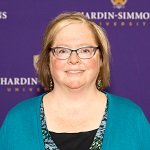
Jenni Jamison is an Assistant Professor in the Hardin-Simmons PA Program, and she currently serves on the Interprofessional Education Committee for the College of Health Professions. She previously worked as a Physician Assistant in primary care at Abilene State Supported Living Center, a residential facility for people with IDD. She is a member of the Texas Academy of Physician Assistants; and currently serves as Vice-Chair for the Diversity, Equity and Inclusion Committee. She is also a member of the American Academy of Physician Associates. She received bachelor’s and master’s degrees in Psychology from Abilene Christian University. She completed the Master of Physician Assistant Studies Degree from Harding University. She and her husband are part of a folk/singer-songwriter trio called JamisonPriest. They perform regularly at local venues and events, and occasionally in other parts of Texas. Jenni is also a long-time singer with Chorus Abilene, and is currently serving on the Board of Directors. She and her husband are active at their church and enjoy spending time with family.
Kathy Robinson DHSc, MPAS, PA-C
Associate Professor
 Dr. Kathy Robinson is an Associate Professor in the Hardin-Simmons University Physician Assistant Program. She attended Angelo State University, earning a Bachelor of Arts degree in English. She graduated from the University of Texas Medical Branch –Galveston with a Master of Physician Assistant Studies. She received her Doctor of Health Science from Nova Southeastern University with an emphasis in Education. Her non-healthcare work experience includes administrative and managerial positions in the financial planning, life/health insurance, and non-profit sectors. In addition, she has clinical experience in allergy, asthma, otolaryngology, and psychiatry/behavioral/substance use disorder medicine. Dr. Robinson is a member of the Texas Academy of Physician Assistants, the American Academy of Physician Assistants, and the American Society for Bioethics and Humanities. She served as a Board Member of the Association of Physician Assistants in Psychiatry. The Texas Academy of Physician Assistants awarded Dr. Robinson the Outstanding PA Educator of the Year in 2020.
Dr. Kathy Robinson is an Associate Professor in the Hardin-Simmons University Physician Assistant Program. She attended Angelo State University, earning a Bachelor of Arts degree in English. She graduated from the University of Texas Medical Branch –Galveston with a Master of Physician Assistant Studies. She received her Doctor of Health Science from Nova Southeastern University with an emphasis in Education. Her non-healthcare work experience includes administrative and managerial positions in the financial planning, life/health insurance, and non-profit sectors. In addition, she has clinical experience in allergy, asthma, otolaryngology, and psychiatry/behavioral/substance use disorder medicine. Dr. Robinson is a member of the Texas Academy of Physician Assistants, the American Academy of Physician Assistants, and the American Society for Bioethics and Humanities. She served as a Board Member of the Association of Physician Assistants in Psychiatry. The Texas Academy of Physician Assistants awarded Dr. Robinson the Outstanding PA Educator of the Year in 2020.
Adjunct Faculty
Austin Alexander PT, DPT, PhD(c)
Adjunct Instructor
 Dr. Alexander is a licensed physical therapist with a clinical focus in pediatric physical therapy. He graduated with his bachelor of science in health and exercise science from the University of Oklahoma in 2011. In 2014 he graduated with his Doctor of Physical Therapy degree from Hardin-Simmons University and received the Dr. William R. Gould Memorial Scholarship. Currently, he is pursuing his PhD in Medical and Health Professions Education with an emphasis on Contemporary Human Anatomy Education from Eastern Virginia Medical School. Dr. Alexander has experience teaching in a variety of graduate level programs with a primary teaching emphasis on human anatomy with more than 10 years of cadaver lab experience. His teaching and research background is directed towards anatomy education, neurology, and pediatric physical therapy. Research interest include use of technology to enhance learning, gold standards in anatomy education, anatomic variation influence on function, and environmental influences on developmental delay in the pediatric population. Clinically, Dr. Alexander words as a pediatric physical therapist dedicated to patient centered care and has clinical experience in a variety of setting, including inpatient rehab, acute care, neonatal intensive care unit, home health, early childhood intervention, and outpatient rehabilitation. He is married to his wife Kelsey and they have four children Hank, Parker, Milliekate, and BrantleyJo.
Dr. Alexander is a licensed physical therapist with a clinical focus in pediatric physical therapy. He graduated with his bachelor of science in health and exercise science from the University of Oklahoma in 2011. In 2014 he graduated with his Doctor of Physical Therapy degree from Hardin-Simmons University and received the Dr. William R. Gould Memorial Scholarship. Currently, he is pursuing his PhD in Medical and Health Professions Education with an emphasis on Contemporary Human Anatomy Education from Eastern Virginia Medical School. Dr. Alexander has experience teaching in a variety of graduate level programs with a primary teaching emphasis on human anatomy with more than 10 years of cadaver lab experience. His teaching and research background is directed towards anatomy education, neurology, and pediatric physical therapy. Research interest include use of technology to enhance learning, gold standards in anatomy education, anatomic variation influence on function, and environmental influences on developmental delay in the pediatric population. Clinically, Dr. Alexander words as a pediatric physical therapist dedicated to patient centered care and has clinical experience in a variety of setting, including inpatient rehab, acute care, neonatal intensive care unit, home health, early childhood intervention, and outpatient rehabilitation. He is married to his wife Kelsey and they have four children Hank, Parker, Milliekate, and BrantleyJo.
Samantha Ethridge, MPAS, PA-C
Adjunct Instructor
 Samantha Ethridge is a Physician Assistant practicing in Family Medicine at Waco Family Medicine in Waco, TX where she has practiced since graduating from University of Texas Medical Branch Physician Assistant Program in 2014. She attended Baylor University and holds a BS Ed in Health Science Studies and MS Ed in Community Health Education. Before starting PA school, she lived in Southeast Asia as a missionary in Sri Lanka and India working to rebuild villages after the devastating tsunami of 2004, planting churches and helping start businesses for the local people. She enjoys spending time with her husband and 3 children and watching football.
Samantha Ethridge is a Physician Assistant practicing in Family Medicine at Waco Family Medicine in Waco, TX where she has practiced since graduating from University of Texas Medical Branch Physician Assistant Program in 2014. She attended Baylor University and holds a BS Ed in Health Science Studies and MS Ed in Community Health Education. Before starting PA school, she lived in Southeast Asia as a missionary in Sri Lanka and India working to rebuild villages after the devastating tsunami of 2004, planting churches and helping start businesses for the local people. She enjoys spending time with her husband and 3 children and watching football.
Sammantha Francis, PA
Adjunct Instructor
 Sammantha Francis is an Adjunct Instructor for Clinical Elective with the Hardin-Simmons Physician Assistant Program. PA Francis completed her undergraduate degree at Baylor University in Medical Humanities. She was a member of the Equestrian Team and won a Big-12 and National Championship during her time with the team. Sammantha graduated Cum Laude and received the Dr. Gerald-Lage award for excellence in sport and academics. She attended Texas Tech University Health Science center and graduated in 2015. PA Francis has been active in precepting students during her time working as a Hospitalist as well as ER medicine. She was on faculty with University of Colorado Neurosurgery department and enjoyed working with residents and fellows during their training as well. In her spare time, you can find Sammantha hiking, kayaking, or fishing.
Sammantha Francis is an Adjunct Instructor for Clinical Elective with the Hardin-Simmons Physician Assistant Program. PA Francis completed her undergraduate degree at Baylor University in Medical Humanities. She was a member of the Equestrian Team and won a Big-12 and National Championship during her time with the team. Sammantha graduated Cum Laude and received the Dr. Gerald-Lage award for excellence in sport and academics. She attended Texas Tech University Health Science center and graduated in 2015. PA Francis has been active in precepting students during her time working as a Hospitalist as well as ER medicine. She was on faculty with University of Colorado Neurosurgery department and enjoyed working with residents and fellows during their training as well. In her spare time, you can find Sammantha hiking, kayaking, or fishing.
Laura Lawrence, MPAS, PA-C
Adjunct Instructor
 Laura Lawrence is a Physician Assistant practicing in Internal Medicine and Urgent Care at the Texas City Community Based Outpatient Clinic for Michael E DeBakey Veterans Affairs Medical Center. She is also an adjunct faculty member for the Hardin-Simmons University Physician Assistant Program as the Course Director for Internal Medicine. She graduated from the University of Texas Medical Branch’s Physician Assistant Program in 2006. Mrs. Lawrence has practiced clinically as a PA for over 12 years in gastroenterology and primary care and previously served as a faculty member and Director of Clinical Education for 5 years at UTMB’s PA Program. She attended St. Mary’s University in San Antonio, TX where she obtained a Bachelors of Arts in Biology. Mrs. Lawrence enjoys spending time with her husband of 15 years and their three children and going to church.
Laura Lawrence is a Physician Assistant practicing in Internal Medicine and Urgent Care at the Texas City Community Based Outpatient Clinic for Michael E DeBakey Veterans Affairs Medical Center. She is also an adjunct faculty member for the Hardin-Simmons University Physician Assistant Program as the Course Director for Internal Medicine. She graduated from the University of Texas Medical Branch’s Physician Assistant Program in 2006. Mrs. Lawrence has practiced clinically as a PA for over 12 years in gastroenterology and primary care and previously served as a faculty member and Director of Clinical Education for 5 years at UTMB’s PA Program. She attended St. Mary’s University in San Antonio, TX where she obtained a Bachelors of Arts in Biology. Mrs. Lawrence enjoys spending time with her husband of 15 years and their three children and going to church.
Dr. Camille Loftin, DHEd, MPAS, PA-C
Adjunct Instructor
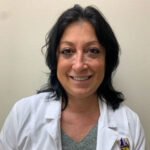 Camille Termini Loftin is a Medical Care Line Physician Assistant at the Texas City Community Based Outpatient Clinic for Michael E DeBakey Veteran Affairs Medical Center. She is also an adjust faculty member for the Hardin-Simmons University Physician Assistant Program as the Course Instructor for Professional Development. She graduated from Texas A&M University in 1989 with a BS in Health Education. She then continued her studies at UTMB and graduated in 1992 from the Physician Assistant Program. She has completed her Doctorate in Health Education at AT Still University. Dr. Loftin worked in the Division of Gastroenterology at UTMB for 4 years, and then went in to private practice in gastroenterology for 14 years before joining the UTMB PAS Department from 2009 to 2017. She has published several abstracts and articles in peer review journals, has numerous poster and oral presentations, and has coordinated several research study protocols. She loves spending time with her husband of 28 years, son, daughter, son-in-law and new grandson Brooks.
Camille Termini Loftin is a Medical Care Line Physician Assistant at the Texas City Community Based Outpatient Clinic for Michael E DeBakey Veteran Affairs Medical Center. She is also an adjust faculty member for the Hardin-Simmons University Physician Assistant Program as the Course Instructor for Professional Development. She graduated from Texas A&M University in 1989 with a BS in Health Education. She then continued her studies at UTMB and graduated in 1992 from the Physician Assistant Program. She has completed her Doctorate in Health Education at AT Still University. Dr. Loftin worked in the Division of Gastroenterology at UTMB for 4 years, and then went in to private practice in gastroenterology for 14 years before joining the UTMB PAS Department from 2009 to 2017. She has published several abstracts and articles in peer review journals, has numerous poster and oral presentations, and has coordinated several research study protocols. She loves spending time with her husband of 28 years, son, daughter, son-in-law and new grandson Brooks.
Gregory Perry, RPh, PharmD, BCPS-AQID, BCIDP
Adjunct Instructor

Dr. Greg Perry is an Adjunct Assistant Professor and serves as the instructor for the Pharmacology and Medical Therapeutics I and II courses. He attended Southwestern Oklahoma State University, earning a Bachelor of Science degree in Pharmacy. He graduated from the University of Arkansas for Medical Sciences with a Doctor of Pharmacy degree. He has clinical and pharmacotherapy expertise in several disciplines including critical care (neonate, pediatric and adult), cardiology, infectious diseases, emergency medicine and parenteral nutrition. Dr. Perry is a Board-Certified Pharmacotherapy Specialist and a Board-Certified Infectious Diseases Pharmacist. Dr. Perry has been involved in the implementation of clinical pharmacy services at several health-systems in Texas and Colorado. Dr. Perry is currently the Pharmacy Residency Program Director at United Regional Healthcare System in Wichita Falls Texas and he recently became a member of the Society of Infectious Disease Pharmacist Education Committee.
Dr. Holly West DHEd, PA-C, DFAAPA
Adjunct Instructor

Dr. Holly West is an Adjunct Instructor with the Hardin-Simmons Physician Assistant Program. She is graduate of Texas A&M University, received her Masters of Physician Assistant Studies degree from the University of Texas Medical Branch (UTMB) in Galveston, and her Doctorate of Health Education degree from A.T. Still University. Dr. West served as the Director of Academic Curricula at UTMB’s PA Program and directed the Clinical Medicine and Skills Practicum courses as well as the Women’s Health rotation. In 2014, Dr. West became a Women’s Health Specialist in the Department of OB/GYN at UTMB where she was responsible for multiple large-scale clinical trials funded by the National Institutes of Health (NIH) and Industry. She also played a regulatory role and worked with the NIH and Food and Drug Administration. Committed to education, she remained heavily involved in the UTMB Medical School curriculum and served as the only PA Co-Director for a School of Medicine course (Endocrine and Reproduction). In July 2019, Dr. West transitioned to the UTMB School of Medicine’s Office of Educational Development as a Senior Medical Educator. A resident of League City, Texas, she lives close to family and enjoys spending time with her husband and son, Eli.
Staff
Michelle Crawford
Admissions Coordinator and Administrative Assistant to Program Director
 Michelle Crawford is the Admissions Coordinator and Administrative Assistant to the Program Director for the Hardin-Simmons University Physician Assistant Program. Michelle was born in Oklahoma and has lived in Abilene since 2011. She enjoys spending time with her husband and three sons.
Michelle Crawford is the Admissions Coordinator and Administrative Assistant to the Program Director for the Hardin-Simmons University Physician Assistant Program. Michelle was born in Oklahoma and has lived in Abilene since 2011. She enjoys spending time with her husband and three sons.
Esther Castilleja
Clinical Coordinator

Esther Castilleja is the Clinical Coordinator in the Hardin Simmons Physician Assistant program. She is a native to Abilene and a graduate of Cooper High School. After graduating high school, Esther moved to Dallas/Fort Worth area. She went to Tarrant County College (TCC) and obtained her Associated of Applied Science, with a focus of study in Respiratory Care. Esther became a Registered Respiratory Therapist in 1997 and worked as a Respiratory Care Practitioner for 25 years for a large healthcare organization, in the DFW area. She obtained her Bachelor of Science from the University of Cincinnati in 2018. Her passion was working as an Asthma Educator and as a Pulmonary Rehab specialist, where she worked on educating her patients on disease management and treatment options of chronic lung conditions. Esther also served on the Advisory Board for the Respiratory Care program at TCC for 12 years, where she mentored students and helped develop curriculum. Esther returned to her hometown of Abilene in 2023 and is happy to be home, where she, her husband, and four-legged babies enjoy living out in the country and being closer to family.
Blair Matos
Academic Support Coordinator
 Blair Matos is the Academic Support Coordinator for the PA Program at Hardin-Simmons University. With nine years of experience as a high school math teacher, she brings a passion for education to her role. Originally from Austin, Texas, Blair has been an Abilene resident for the past 14 years. Her Bachelor of Science degree in Mathematics from McMurry University forms a solid foundation for her work in academic support. As a loving wife and mother of two, Blair cherishes her family life and is dedicated to guiding the next generation of healthcare professionals at Hardin-Simmons University.
Blair Matos is the Academic Support Coordinator for the PA Program at Hardin-Simmons University. With nine years of experience as a high school math teacher, she brings a passion for education to her role. Originally from Austin, Texas, Blair has been an Abilene resident for the past 14 years. Her Bachelor of Science degree in Mathematics from McMurry University forms a solid foundation for her work in academic support. As a loving wife and mother of two, Blair cherishes her family life and is dedicated to guiding the next generation of healthcare professionals at Hardin-Simmons University.
If you’re considering earning a Master of Physician Assistant Studies degree, you may also be interested in learning about these similar programs at Hardin-Simmons University:
Health Professions Postbaccalaureate Program (Postbacc)



